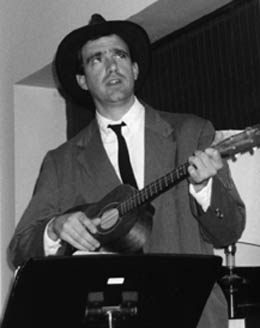|
|
|
|
All
the News that Rhymes (Sometimes)
by Sandra Ahten |
 Newspoems have graced the pages
of each edition of the public i to date, but Newspoetry
was not originally published on newsprint. As a matter
of fact, under its web site’s masthead you can sometimes
find a quote by Thomas Jefferson stating that “Nothing
now can be believed which is seen in a newspaper.”
Newspoems have graced the pages
of each edition of the public i to date, but Newspoetry
was not originally published on newsprint. As a matter
of fact, under its web site’s masthead you can sometimes
find a quote by Thomas Jefferson stating that “Nothing
now can be believed which is seen in a newspaper.”
Newspoetry is a project initiated by Urbana poet William
Gillespie, in part as an elaborate attempt to get himself
to read the newspaper. He coined the term “Newspoetry”
in December 1995, when he made it his New Year’s resolution
to write a poem a day about events in the news in 1996.
He didn’t send the poems to publishers, or even tell friends
what he was up to. Instead, he disseminated the poems
covertly through newspaper machines, public bulletin boards,
tip jars, the departmental mailboxes of unsuspecting college
professors, and bathroom walls.
During 1996 and 1997 William wasn’t always successful
in his mission to write a poem a day, as he was occasionally
distracted by little things like writing a master’s thesis,
finding work, and writing for his radio program, Eclectic
Seizure (heard on WEFT 90.1 FM every other Wednesday from
8 to 10 pm). But he persevered.
In 1998 the Newspoetry format changed to that of a one-page
newspaper entitled “The Daily Poem”, whose masthead offered
slogans such as “All the News that Rhymes” and abstract
weather summaries (“Weather: vague”).
Gillespie elaborates on the mission and origin of Newspoetry:
“The problem was finding a writing project that was focused
on readers rather than on the writer. Newspoetry was a
solution to that problem for a few reasons. The writing
was anonymous. It was also furiously anachronistic and
unpublishable. In addition to breaking the rules of poetry
and being, in general, hastily-written, these newspoems
were in no way timeless classics. They were, in fact,
instantly dated, and their relevance was, for the most
part, limited to the week in which they were written.”
“Most of the poems were not about me or my experiences,”
Gillespie continues. “Even the poems written in the first
person were about my observations of other people and
events. Another impetus behind the idea for Newspoetry
was complaints from friends on the left, who were concerned
about events in the news but couldn’t stand reading the
newspaper. Was there a way of rescuing the news from the
style in which it is written?”
The trajectory of Newspoetry changed dramatically later
in 1998 when Gillespie learned how to design web sites.
For 1999, William decided to re-invoke his 1996 New Year’s
resolution; he determined to publish a poem a day about
events in the news by posting the poems on the Internet.
He solicited participation from friends, but underestimated
the response. By the end of the first week in January
he had received two newspoems from Dirk Stratton, two
from Joe Futrelle, and a sonnet from Scott Rettberg. Newspoetry
was suddenly soaring in cyberspace. While the momentum
has continued to build ever since, those first contributors
to Newspoetry are still writing newspoems today. They
are joined by other poets from reaches near and far.
Gillespie relates that the Web has allowed the Newspoetry
project to realize its potential in ways that print never
could, by:
- Avoiding most of the expenses associated with print
technology, whose physical nature makes a daily publication
having international distribution possible only for
those with massive resources;
- Bypassing a literature market in which the only
thing that sells worse than poetry is political poetry;
- Circumventing an academic infrastructure whose competitive
and insular environment renders its literature venues
closed to (and largely irrelevant to) the general
public;
- Making an end run around publishers whose corporate
owners are averse to anticorporate sentiment;
- Taking full advantage of the fuzzy nature of Internet
laws regarding slander and libel to embody the distilled
essence of freedom of speech: an open forum in which
anyone can respond immediately to world events, and
address poetry to power;
- Making possible (which Gillespie believes is Newspoetry’s
most important contribution) a collaboration among
far-flung strangers, as we all share the same news.
In addition, the unique hypertextual
nature of the Web is often exploited in the Newspoetry
forum. Many newspoems contain embedded links. Some poems
are linked to other poems, as in the case where one newspoem
is written in response to another. Attimes a poem might
be linked to the news source that inspired the poem, or
to a biographical web site. And there are occasional links
to miscellaneous material (for example, a page on the
McDonalds corporate site listing words and phrases to
which McDonalds owns the copyright).
Today William Gillespie is no longer at the helm of the
Enterprise. He handed the keys to his friend and high
school newspaper co-editor, Joe Futrelle, who has been
Newspoetry Editor (self-proclaimed Editor-despite-chief
or Editor-within-chief, among other whimsical titles)
and Webmaster since Y2K. Gillespie says that Futrelle’s
fluency in computing, writing, and left-wing politics,
in combination with his cooperative personality, made
him one of the only people who could have been entrusted
with this challenging position. Today Gillespie thinks
of his own role in Newspoetry in the same terms in which
Jerry Garcia was credited on the first Jefferson Airplane
album: “spiritual advisor”.
To read newspoetry or to contribute a newspoem for publication,
go to www.newspoetry.org. |
|
|
|





